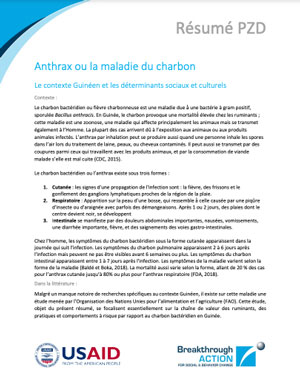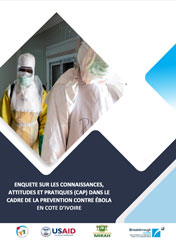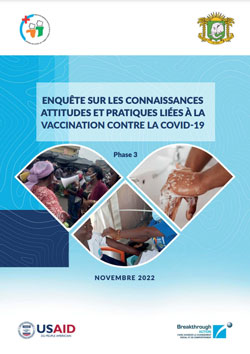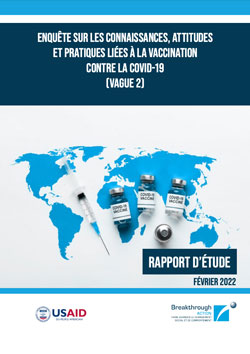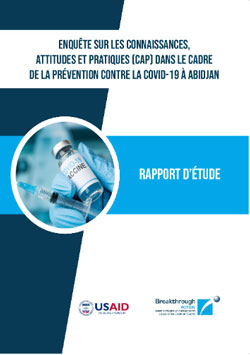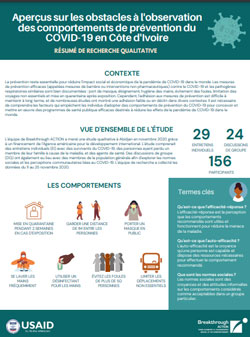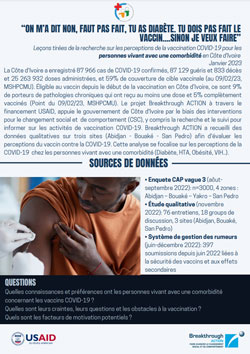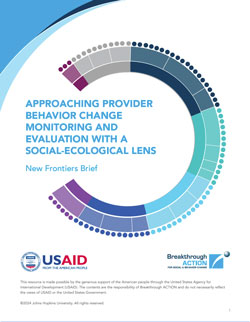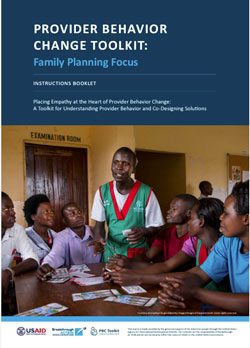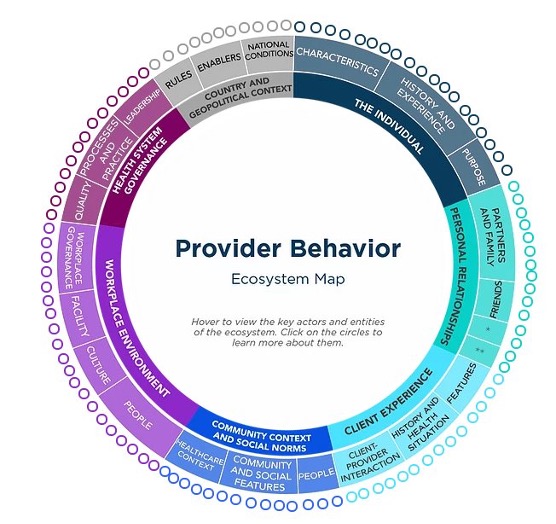Enquête sur les Connaissances, Attitudes et Pratiques (CAP) dans le Cadre de la Prévention contre Ébola en Côte d’Ivoire
La grande épidémie d’Ébola qui a débuté dans les zones rurales de la Guinée en décembre 2013 a démontré le besoin urgent de communication des risques et d’engagement communautaire (CREC) afin d’identifier et de contenir rapidement les épidémies de maladies infectieuses. Après s’être propagée à Conakry, la capitale de la Guinée, à la mi-2014, l’épidémie s’est répandue en Sierra Leone et au Liberia en juillet 2014. En fin de compte, on a recensé 28 616 cas au total dans les trois pays, dont 3 814 cas et 2 544 décès pour la seule Guinée. La récente réémergence d’Ébola en Guinée a rendu la réponse à COVID-19 plus complexe et a nécessité une réponse intégrée.
Le Centre de Programmes de Communication (CCP) de Johns Hopkins est le principal responsable de la mise en œuvre du projet Breakthrough ACTION. Breakthrough ACTION est un accord de coopération quinquennal de l’Agence américaine pour le développement international (USAID) visant à diriger la programmation de l’USAID en matière de changement social et comportemental dans le monde. En Côte d’Ivoire, CCP, par le biais de Breakthrough ACTION, s’emploie à améliorer l’adoption de pratiques sanitaires bénéfiques afin de contribuer à l’objectif plus large d’amélioration des résultats en matière de santé et de développement dans les domaines d’intervention du programme. L’USAID a chargé Breakthrough ACTION-Côte d’Ivoire de soutenir le gouvernement (de CDI) à travers le GTT pour la préparation à la prévention et la réponse contre la maladie à virus Ebola (MVE). Cela se traduit par la reconnaissance des symptômes par la population, la recherche des soins et l’acceptation de la vaccination. Les interventions de CREC visent à répondre aux craintes de la population, à instaurer la confiance et à promouvoir des attitudes et des normes positives pour favoriser des comportements spécifiques. Pour réussir la CREC, il est essentiel d’avoir une compréhension actualisée des connaissances, des attitudes, des croyances, des intentions et des normes spécifiques au contexte qui précèdent et favorisent les comportements.
Survey on Knowledge, Attitudes, and Practices (KAP) for Ebola Prevention in Côte d’Ivoire
The major Ebola epidemic that began in rural Guinea in December 2013 demonstrated the urgent need for risk communication and community engagement (CREC) to rapidly identify and contain infectious disease outbreaks. After spreading to Guinea’s capital Conakry in mid-2014, the epidemic spread to Sierra Leone and Liberia in July 2014. Ultimately, a total of 28,616 cases were recorded in the three countries, including 3,814 cases and 2,544 deaths in Guinea alone. The recent re-emergence of Ebola in Guinea has made the response to COVID-19 more complex and necessitated an integrated response.
The Johns Hopkins Center for Communication Programs (CCP) is primarily responsible for implementing the Breakthrough ACTION project. Breakthrough ACTION is a five-year cooperative agreement of the U.S. Agency for International Development (USAID) to lead USAID’s social and behavioral change programming around the world. In Côte d’Ivoire, CCP, through Breakthrough ACTION, is working to improve the adoption of beneficial health practices to contribute to the broader goal of improving health and development outcomes in the program’s focus areas. USAID has commissioned Breakthrough ACTION-Côte d’Ivoire to support the government (of CDI) through the TWG in preparing for Ebola Virus Disease (EVD) prevention and response. This translates into the population recognizing symptoms, seeking care, and accepting vaccination. CREC interventions aim to address people’s fears, build trust, and promote positive attitudes and norms to encourage specific behaviors. To succeed in CREC, it is essential to have an up-to-date understanding of the context-specific knowledge, attitudes, beliefs, intentions, and norms that precede and promote behaviors.
Source: Johns Hopkins Center for Communication Programs
Date of Publication: June 10, 2024

